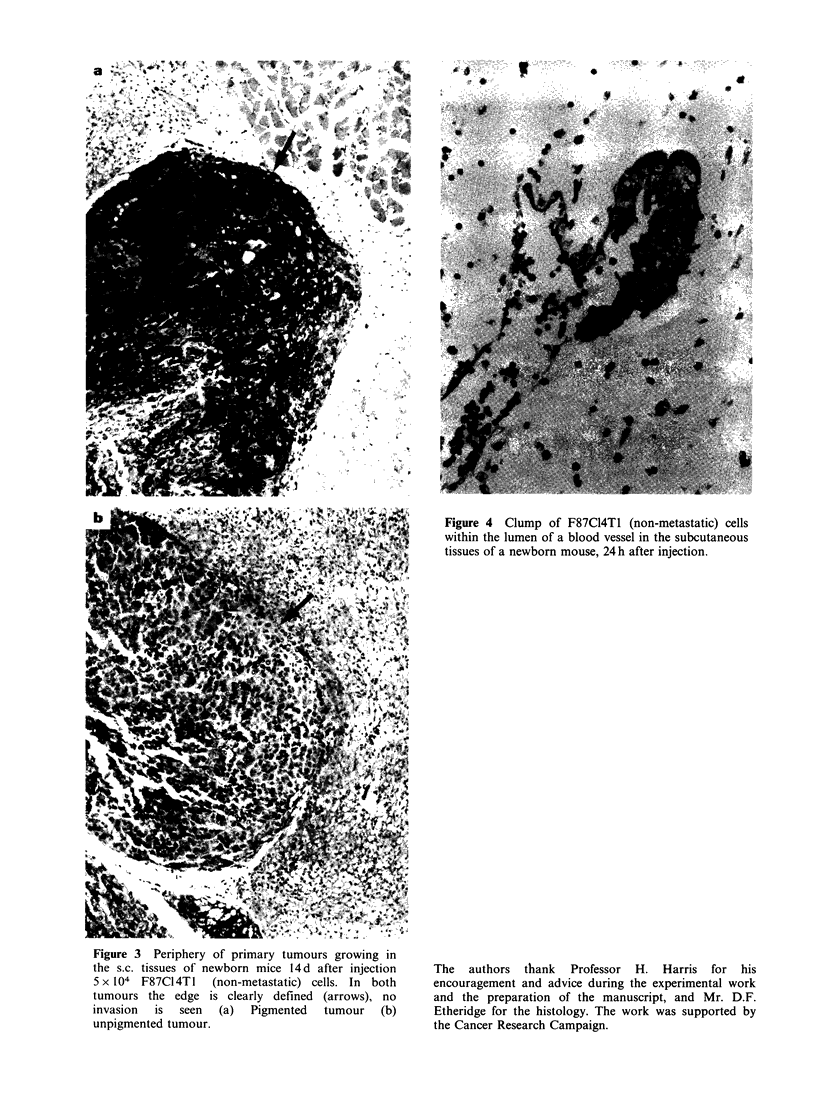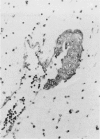Abstract
Cell fusion has been used to analyse the genetic determinants of metastasis at the cellular level. Highly metastatic mouse melanoma cells were fused with diploid mouse lymphocytes and a range of hybrid clones isolated and tested for tumorigenicity and metastatic potential by s.c. injection into newborn, histocompatible, sublethally-irradiated mice. Although almost all clones tested were tumorigenic, most had considerably reduced metastatic potential. This suggests that tumorigenicity and metastasis are determined by different genetic elements. Histological examination of primary tumours produced by metastatic and non-metastatic hybrid cell lines showed that an essential step in the production of metastases is the separation of tumour cells from the main tumour mass and their movement into the surrounding tissues. The primary tumours of a metastatic hybrid cell line showed local invasiveness whereas those of a non-metastatic cell line did not.
Full text
PDF






Images in this article
Selected References
These references are in PubMed. This may not be the complete list of references from this article.
- Chen T. R. In situ detection of mycoplasma contamination in cell cultures by fluorescent Hoechst 33258 stain. Exp Cell Res. 1977 Feb;104(2):255–262. doi: 10.1016/0014-4827(77)90089-1. [DOI] [PubMed] [Google Scholar]
- Evans E. P., Burtenshaw M. D., Brown B. B., Hennion R., Harris H. The analysis of malignancy by cell fusion. IX. Re-examination and clarification of the cytogenetic problem. J Cell Sci. 1982 Aug;56:113–130. doi: 10.1242/jcs.56.1.113. [DOI] [PubMed] [Google Scholar]
- Fidler I. J., Kripke M. L. Metastasis results from preexisting variant cells within a malignant tumor. Science. 1977 Aug 26;197(4306):893–895. doi: 10.1126/science.887927. [DOI] [PubMed] [Google Scholar]
- Fidler I. J. Selection of successive tumour lines for metastasis. Nat New Biol. 1973 Apr 4;242(118):148–149. doi: 10.1038/newbio242148a0. [DOI] [PubMed] [Google Scholar]
- Giavazzi R., Alessandri G., Spreafico F., Garattini S., Mantovani A. Metastasizing capacity of tumour cells from spontaneous metastases of transplanted murine tumours. Br J Cancer. 1980 Sep;42(3):462–472. doi: 10.1038/bjc.1980.259. [DOI] [PMC free article] [PubMed] [Google Scholar]
- HARRIS H., WATKINS J. F. HYBRID CELLS DERIVED FROM MOUSE AND MAN: ARTIFICIAL HETEROKARYONS OF MAMMALIAN CELLS FROM DIFFERENT SPECIES. Nature. 1965 Feb 13;205:640–646. doi: 10.1038/205640a0. [DOI] [PubMed] [Google Scholar]
- Harris H. Cell fusion and the analysis of malignancy. Proc R Soc Lond B Biol Sci. 1971 Oct 12;179(1054):1–20. doi: 10.1098/rspb.1971.0078. [DOI] [PubMed] [Google Scholar]
- Harris H., Miller O. J., Klein G., Worst P., Tachibana T. Suppression of malignancy by cell fusion. Nature. 1969 Jul 26;223(5204):363–368. doi: 10.1038/223363a0. [DOI] [PubMed] [Google Scholar]
- Jonasson J., Povey S., Harris H. The analysis of malignancy by cell fusion. VII. Cytogenetic analysis of hybrids between malignant and diploid cells and of tumours derived from them. J Cell Sci. 1977 Apr;24:217–254. doi: 10.1242/jcs.24.1.217. [DOI] [PubMed] [Google Scholar]
- LITTLEFIELD J. W. SELECTION OF HYBRIDS FROM MATINGS OF FIBROBLASTS IN VITRO AND THEIR PRESUMED RECOMBINANTS. Science. 1964 Aug 14;145(3633):709–710. doi: 10.1126/science.145.3633.709. [DOI] [PubMed] [Google Scholar]
- Mareel M., Kint J., Meyvisch C. Methods of study of the invasion of malignant C3H-mouse fibroblasts into embryonic chick heart in vitro. Virchows Arch B Cell Pathol Incl Mol Pathol. 1979 May 4;30(1):95–111. doi: 10.1007/BF02889094. [DOI] [PubMed] [Google Scholar]
- Nicolson G. L., Winkelhake J. L. Organ specificity of blood-borne tumour metastasis determined by cell adhesion? Nature. 1975 May 15;255(5505):230–232. doi: 10.1038/255230a0. [DOI] [PubMed] [Google Scholar]
- Poste G., Doll J., Fidler I. J. Interactions among clonal subpopulations affect stability of the metastatic phenotype in polyclonal populations of B16 melanoma cells. Proc Natl Acad Sci U S A. 1981 Oct;78(10):6226–6230. doi: 10.1073/pnas.78.10.6226. [DOI] [PMC free article] [PubMed] [Google Scholar]
- Poste G., Doll J., Hart I. R., Fidler I. J. In vitro selection of murine B16 melanoma variants with enhanced tissue-invasive properties. Cancer Res. 1980 May;40(5):1636–1644. [PubMed] [Google Scholar]
- Poste G., Fidler I. J. The pathogenesis of cancer metastasis. Nature. 1980 Jan 10;283(5743):139–146. doi: 10.1038/283139a0. [DOI] [PubMed] [Google Scholar]
- Stackpole C. W. Distinct lung-colonizing and lung-metastasizing cell populations in B16 mouse melanoma. Nature. 1981 Feb 26;289(5800):798–800. doi: 10.1038/289798a0. [DOI] [PubMed] [Google Scholar]
- Tao T. W., Burger M. M. Non-metastasising variants selected from metastasising melanoma cells. Nature. 1977 Dec 1;270(5636):437–438. doi: 10.1038/270437a0. [DOI] [PubMed] [Google Scholar]
- Weiss L., Mayhew E., Rapp D. G., Holmes J. C. Metastatic inefficiency in mice bearing B16 melanomas. Br J Cancer. 1982 Jan;45(1):44–53. doi: 10.1038/bjc.1982.6. [DOI] [PMC free article] [PubMed] [Google Scholar]
- Wiener F., Klein G., Harris H. The analysis of malignancy by cell fusion. VI. Hybrids between different tumour cells. J Cell Sci. 1974 Oct;16(1):189–198. doi: 10.1242/jcs.16.1.189. [DOI] [PubMed] [Google Scholar]





